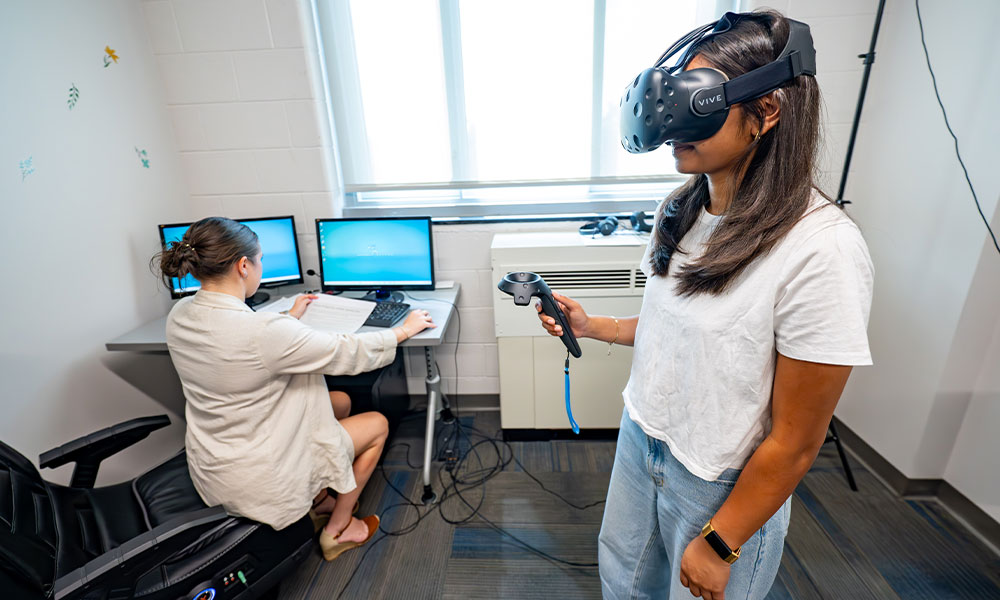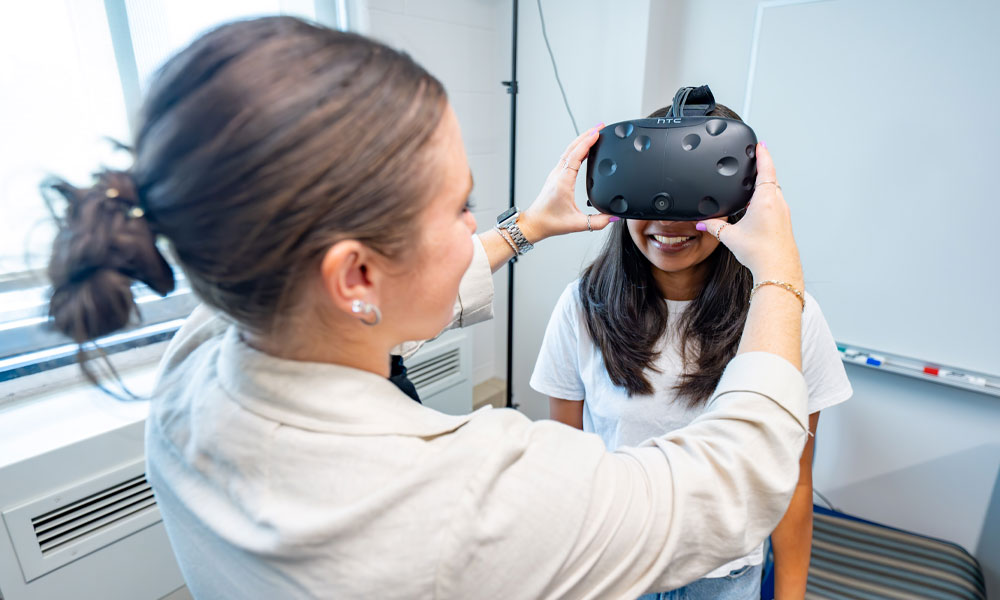The BRAVE-PS Program at CMHS
Building Resiliency Across Virtual-Reality Exposure for Public Speaking
Fear of Public Speaking, also known as glossophobia, can have negative consequences ranging from physical symptoms and emotional distress to hindering career advancement, impacting academic success and limiting social interactions. Many individuals avoid public speaking, leading to missed opportunities and increased anxiety. The fear can also increase symptoms of other emotional difficulties like social anxiety, depression and increase the risk of developing anxiety disorders.
Can Virtual Reality Help Me?
In short, YES!
Virtual Reality (VR) therapy offers a brief and effective way to treat public speaking anxiety. By immersing individuals in a virtual environment with a simulated audience, VR therapy allows for repeated exposure and practice, helping to reduce anxiety and build confidence in a safe, controlled setting.

Here's how it works:
Exposure Therapy:
VR therapy mimics exposure therapy, a technique where individuals gradually confront their fears. In this case, they face virtual audiences, allowing them to practice and desensitize themselves to the anxiety-provoking situation.
Controlled Environment:
VR provides a safe space to practice. Users can adjust the size and behavior of the virtual audience, practice different presentation scenarios, and receive feedback without the real-world consequences of failure.
Accessibility:
VR therapy is increasingly accessible, with some platforms using readily available devices like smartphones and low-cost VR viewers.
Evidence-Based:
Research suggests that VR exposure therapy can lead to significant reductions in public speaking anxiety, even after a single session.

Benefits of VR Therapy for Public Speaking Anxiety:
Reduced Anxiety:
Consistent practice in VR can lead to a decrease in self-reported anxiety related to public speaking.
Increased Confidence:
As users become more comfortable with the virtual environment, they often experience a boost in their confidence in real-life speaking situations.
Skill Development:
VR platforms can offer tailored training modules, helping users develop specific presentation skills and strategies.
Accessibility and Affordability:
VR therapy offers a more accessible and potentially more affordable alternative to traditional in-person therapy.
In summary: VR therapy is a promising and increasingly accessible tool for managing and overcoming public speaking anxiety. By providing a safe, controlled, and customizable environment for practicing and building confidence, VR therapy offers a potentially rapid and effective path to reducing anxiety and improving public speaking skills.
Some articles and research on the effectiveness of VR for Public Speaking fears:
Learn more about the ways Fear of Public Speaking effect you:
Physical Symptoms:
Physiological Responses:
Rapid heartbeat, sweating, trembling, nausea, dizziness, muscle tension, and shortness of breath are common physical manifestations of anxiety related to public speaking.
Panic Attacks:
In severe cases, the fear can trigger panic attacks, characterized by intense fear, chest pain, and difficulty breathing.
Increased Stress Hormones:
The body releases stress hormones like cortisol, which can negatively impact the immune system and potentially lead to cardiovascular issues.
Emotional and Psychological Impacts:
Avoidance Behaviors:
A fear of public speaking can lead to avoiding situations where speaking in public is required, like meetings, class, presentations, or social gatherings.
Social Isolation:
Avoiding social interactions can contribute to feelings of loneliness and isolation.
Low Self-Esteem:
Negative experiences with public speaking can erode confidence and self-esteem.
Anxiety Disorders:
Severe glossophobia can be a symptom or a precursor to other anxiety disorders, including social anxiety disorder.
Career and Academic Consequences:
Hindered Advancement:
Fear of public speaking can limit career and academic opportunities, particularly in roles that require presentations or leadership positions.
Missed Opportunities:
Individuals may hesitate to participate in important meetings, presentations, or networking events, leading to missed opportunities for professional growth.
Impact on Academic Performance:
Students with a fear of public speaking may struggle in class participation, presentations, and even choosing certain courses.
Reduced Earning Potential:
Studies suggest that fear of public speaking can impact earning potential due to missed opportunities for promotion and advancement.
Other Potential Consequences:
Difficulty with Interactions:
The fear can manifest in social situations, making it challenging to interact with strangers or engage in conversations.
Increased Stress:
Worrying about upcoming speaking engagements can lead to chronic stress and sleep problems.
Impact on Relationships:
In some cases, the fear can strain personal relationships if the individual consistently avoids social situations or events.
